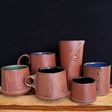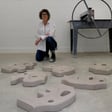
Finding Joy and Breaking Rules in Pottery with Tzipporah Schvarcz
In this episode of 'Shape Your Pottery,' host Nic Torres interviews Tzipporah Schvarcz, a passionate potter who shares her thoughts on the importance of creative freedom in ceramics. They discuss the negative impact of rigid rules on artistic expression and the value of exploring different techniques, even if one feels inexperienced. Tzipporah recounts her journey into ceramics, emphasizing the joy and fulfillment it brings her. She highlights her shift from making and selling pottery to teaching and hosting virtual workshops, which has allowed her to maintain her passion. Tzipporah underscores the significance of community support, managing comparisons on social media, and the multiple facets of finding one's unique voice in pottery. You can learn more about Tzipporah by checking out her instagram https://www.instagram.com/sipor.ceramics/
Join The Shaping Your Pottery Newsletter By Clicking This Link shapingyourpottery.com/newsletter
Join the Clay Games Community to connect with like minded potters and compete in monthly pottery competitions Join Here
00:00 Introduction to the Joy of Ceramics
00:15 Challenging the Rules in Pottery
01:09 Breaking Boundaries in Ceramics
03:39 The Journey Begins: Discovering Ceramics
05:44 Embracing Failure and Growth
06:55 Navigating Social Media and Personal Growth
11:12 Finding Clarity at NSEACA 2023
13:53 Shifting Focus: From Selling to Teaching
22:19 Balancing Life and Pottery
27:00 Advice for Aspiring Potters and Educators
30:55 Discovering and Honing Your Unique Voice
35:10 Final Thoughts and Farewell







